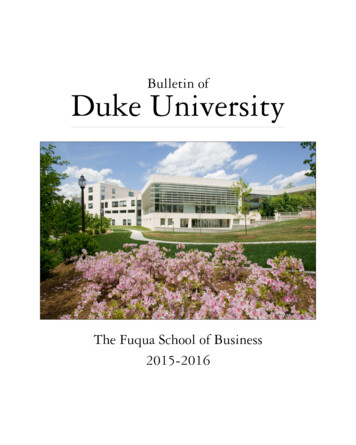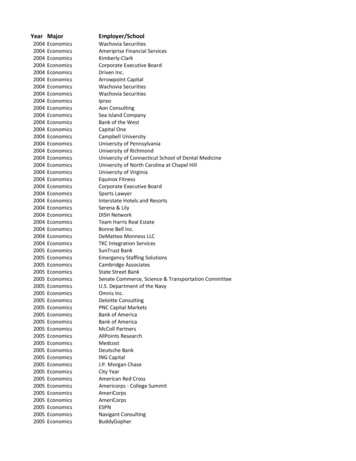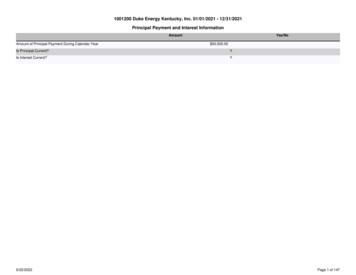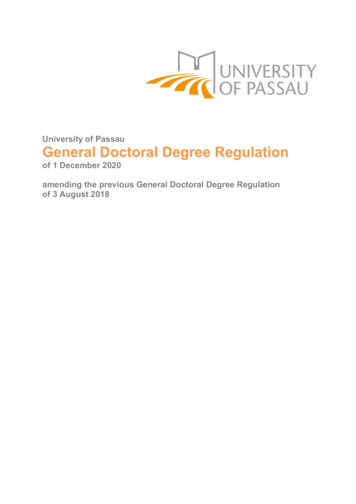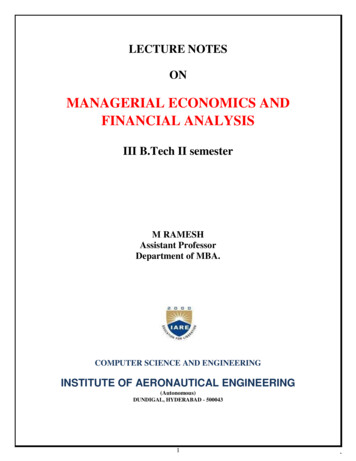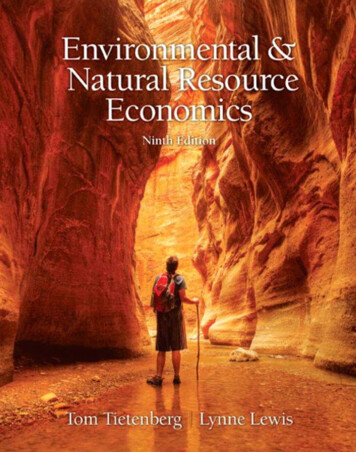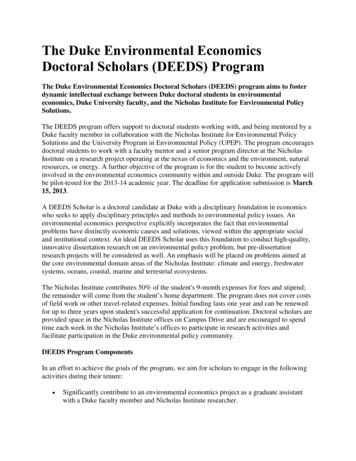
Transcription
The Duke Environmental EconomicsDoctoral Scholars (DEEDS) ProgramThe Duke Environmental Economics Doctoral Scholars (DEEDS) program aims to fosterdynamic intellectual exchange between Duke doctoral students in environmentaleconomics, Duke University faculty, and the Nicholas Institute for Environmental PolicySolutions.The DEEDS program offers support to doctoral students working with, and being mentored by aDuke faculty member in collaboration with the Nicholas Institute for Environmental PolicySolutions and the University Program in Environmental Policy (UPEP). The program encouragesdoctoral students to work with a faculty mentor and a senior program director at the NicholasInstitute on a research project operating at the nexus of economics and the environment, naturalresources, or energy. A further objective of the program is for the student to become activelyinvolved in the environmental economics community within and outside Duke. The program willbe pilot-tested for the 2013-14 academic year. The deadline for application submission is March15, 2013.A DEEDS Scholar is a doctoral candidate at Duke with a disciplinary foundation in economicswho seeks to apply disciplinary principles and methods to environmental policy issues. Anenvironmental economics perspective explicitly incorporates the fact that environmentalproblems have distinctly economic causes and solutions, viewed within the appropriate socialand institutional context. An ideal DEEDS Scholar uses this foundation to conduct high-quality,innovative dissertation research on an environmental policy problem, but pre-dissertationresearch projects will be considered as well. An emphasis will be placed on problems aimed atthe core environmental domain areas of the Nicholas Institute: climate and energy, freshwatersystems, oceans, coastal, marine and terrestrial ecosystems.The Nicholas Institute contributes 50% of the student's 9-month expenses for fees and stipend;the remainder will come from the student’s home department. The program does not cover costsof field work or other travel-related expenses. Initial funding lasts one year and can be renewedfor up to three years upon student's successful application for continuation. Doctoral scholars areprovided space in the Nicholas Institute offices on Campus Drive and are encouraged to spendtime each week in the Nicholas Institute’s offices to participate in research activities andfacilitate participation in the Duke environmental policy community.DEEDS Program ComponentsIn an effort to achieve the goals of the program, we aim for scholars to engage in the followingactivities during their tenure: Significantly contribute to an environmental economics project as a graduate assistantwith a Duke faculty member and Nicholas Institute researcher.
Conduct economics research on an environmental policy topic at the dissertation or predissertation stage.Actively participate in UPEP student/faculty environmental and resource economics(ERE) colloquia and present ongoing research at least once a year at a colloquiumseminar, including a presentation of dissertation research.Contribute to university programs through activities such as leading a lecture in a coursefocused on environmental, resource or energy economics, mentoring undergraduatestudents, leading a professional development workshop, or participating in a paneldiscussion.Expectations of the Duke Faculty Member and Nicholas Institute Program LeadThe success of the DEEDS Program rests largely on the mentoring relationship between thedoctoral scholar, the Duke faculty mentor, and program area leaders at the Nicholas Institute. Assuch, it is expected that the faculty will provide career development mentoring and opportunitieswhich will increase the likelihood of a successful launching of a scholar's career inenvironmental economics. Nicholas Institute program leads are expected to couple researchmentoring with real application to the solution of critical environmental problems in climate,energy, freshwater, oceans, coastal, marine, and terrestrial ecosystems.PROGRAM DETAILS AND APPLICATIONPROCEDURES1. Student Eligibilitya. Any Duke doctoral student currently enrolled full time in the UPEP economics track , theEconomics Department PhD program, or the Sanford School Public Policy PhD programeconomics concentration. The student must be working with (or proposing to work with)a UPEP faculty member. A UPEP faculty is a faculty member affiliated with the DukeUniversity PhD Program in Environmental ral/upep/faculty). The program will alsoconsider mentorship by other Duke faculty members whose primary discipline iseconomics and who have a demonstrated track record on environmental policy research.b. Doctoral student must show evidence of significant interest in research on importantenvironmental policy topics in one of the main Nicholas Institute environmental topicareas: climate, energy, freshwater, oceans, coastal, marine, and terrestrial ecosystems.c. DEEDS Scholars must be making successful academic progress in their homedepartment.2. Program DurationThe scholar appointment is for a minimum period of 9 months (September to May). The initialintent is that scholars will be able to apply for continuation each year for a potential total support
period of up to three years. Please note: The program is being pilot-tested for the 2013-14academic year and could be modified based on this initial experience.3. DeadlineThe deadline for application submission is March 15, 2013.4. ApplicationDoctoral students can apply to become a DEEDS Scholar as early as their first year at Duke forthe start of the next academic year. Successful application to the program depends on the matchbetween student interest, that of the proposed faculty member, and Nicholas Institute programdirectors; the proposed research topic; and the number of current Scholars from the samedepartment.Please submit the following items by email to deeds@duke.edu by March 15, 2013, with "DukeEnvironmental Economics Doctoral Scholars Application" in the subject line of your message.Brief application. Use the attachment.A 3-5 page statement describing your background, environmental interest, planned dissertationfocus, and proposed research collaboration with Duke faculty and Nicholas Institute programarea. (submitted directly by applicant)Current curriculum vitae (submitted directly by applicant)Nomination letter from Duke faculty mentor verifying faculty's interest in working with you.(submitted directly by faculty member)Statement of support from home department advisor, if not same person as the faculty memberabove. (submitted directly by advisor)Letter of recommendation from the Director of Graduate Studies of your home department.(submitted directly by DGS)Transcript of graduate-level coursework from Duke.QUESTIONS?Please contact Brian Murray, Director for Economic Analysis at the Nicholas Institute forEnvironmental Policy Solutions at Brian.Murray@duke.edu.
DEEDS Program Application Attachment1. Contact Information:a. First Name:b. Last Name:c. Home Phone:d. Email Address:e. Mailing Address:2. Duke doctoral program in which you are currently enrolled:3. Current year in doctoral program:4. Which of the following applies to you?a. Currently enrolled in full-time courseworkb. Passed qualifying examc. Preparing dissertation proposald. Conducting dissertation proposal5. Please provide the name of your faculty mentor:6. Provide a brief description of your research topic and/or interests:
2. Duke doctoral program in which you are currently enrolled: 3. Current year in doctoral program: 4. Which of the following applies to you? a. Currently enrolled in full-time coursework b. Passed qualifying exam c. Preparing dissertation proposal d. Conducting dissertation proposal 5. Please provide the name of your faculty mentor: 6.


